Published by WorldCargo News September 13, 2018
Jade Logistics has announced a step into the blockchain area, through a partnership with Swiss-based platform provider CargoChain.

Jade Logistics has announced a step into the blockchain area, through a partnership with Swiss-based platform provider CargoChain.

Breakbulk Americas 2018 is a fantastic event for the logistics industry, bringing together shippers and suppliers from around the world.
Jade Logistics are exhibiting at Breakbulk Americas from 2-4 October, 2018, in at the George Brown Convention Centre in Houston, Texas, USA.
You’ll find us at booth 1305, so make sure you stop by to meet the team and see the world’s leading terminal operating system—Master Terminal—for mixed cargo ports, in action. Discover how Master Terminal helps ports and terminal operators around the world manage their mixed cargo requirements, the easy way.
If you want to make sure you don’t miss a Master Terminal demonstration, please schedule a time with us here.
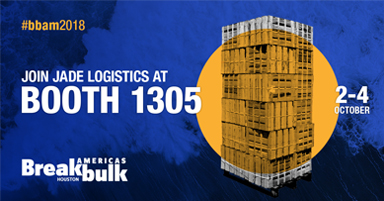
We look forward to seeing you there!
Kaustubh Dalvi, Keith McSwain and Jay Kronberg
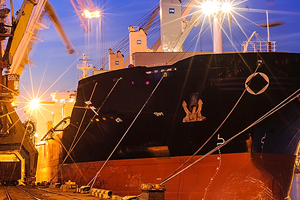
Jade Logistics has won a contract to install its Master Terminal TOS at 14 terminals in Indonesia operated by Pelindo I.

The contract is a major win for Jade Logistics, and its first in SE Asia. “PT Pelabuhan Indonesia I (Pelindo I) has selected the terminal operating system (TOS), Master Terminal, from Jade Logistics, to manage their mixed cargo operations at 14 terminals in the provinces of Nanggroe Aceh Darussalam (Aceh), Sumatera Utara (North Sumatra), Riau, and Riau Islands (Kepulauan Riau). Master Terminal will replace Pelindo I’s legacy systems and will help modernize and optimize their terminal operations,” Jade stated.
The roll out will take place in stages over an 18-month period. The first three terminals in the process of implementing Master Terminal are at the ports of Dumai, Sibolga, and Malahayati, and are set to go live by the third quarter of 2018, with the remaining terminals live by mid 2019.
With a large number of multi purpose terminals, Indonesia is a good fit for Jade’s multi-cargo TOS, which will support the 14 different terminals from a single instance of Master Terminal. After Jade Logistics was spun out from Jade Software Corporation (JSC) last year the company, led by CEO David Lindsay, has pursued an aggressive growth strategy that includes pushing into new markets. Before winning this contract it set up an office in Jakarta.
Commenting on winning the contract with Pelindo I, Jade said: “In support of the Indonesian Government’s Maritime port infrastructure upgrade program, dubbed the Indonesian-sea-toll-road program, Pelindo I (one of four Indonesian state-owned port operators) sought an integrated TOS that supported multiple cargo types and facilities to grow alongside the business. Master Terminal was a clear frontrunner, with a proven track record of handling a mixture of break-bulk, bulk, container and Roll-On/Roll-Off (RORO) cargo. Key functionality such as the ability to integrate with the Government Customs system, InaPortNet, and an SAP finance system, were features that won Pelindo I over”.
Pelindo I has a vision is to become the leading Port Business in Indonesia. “Investing in state-of-the- art technology, such as the Master Terminal application, supplemented with improved operational processes, training, and equipment, will ensure Pelindo I is in a position to handle current and future cargo volumes more efficiently and more cost-effectively,” Jade added.
“We are thrilled to partner with Pelindo I on this project,” remarked Lindsay. “The opportunities for them in this region are immense and we’re looking forward to seeing their coastal hubs, industry and economy grow. We’re excited to play a part in Indonesia’s greater expansion plans and seeing what the future holds.”

Jade Logistics has won a contract to install its Master Terminal TOS at 14 terminals in Indonesia operated by Pelindo I.
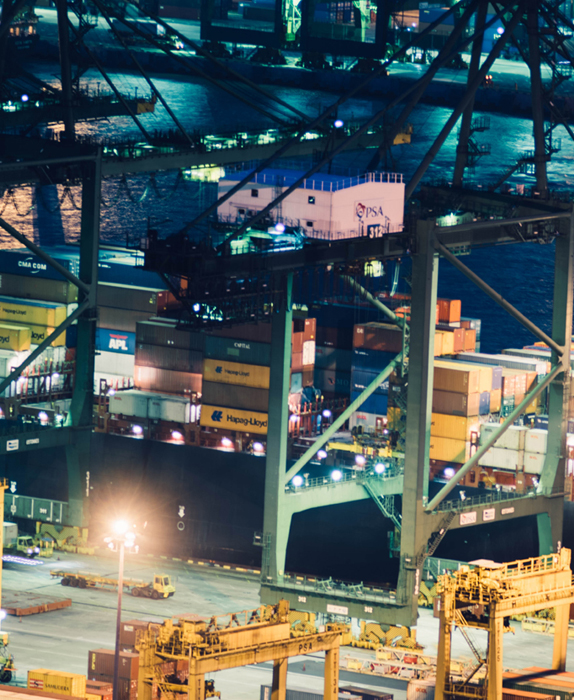
David Lindsay, CEO of Jade Logistics, recently spoke with WorldCargo News about how the company is looking to grow aggressively while targeting the multi-cargo terminal sector.
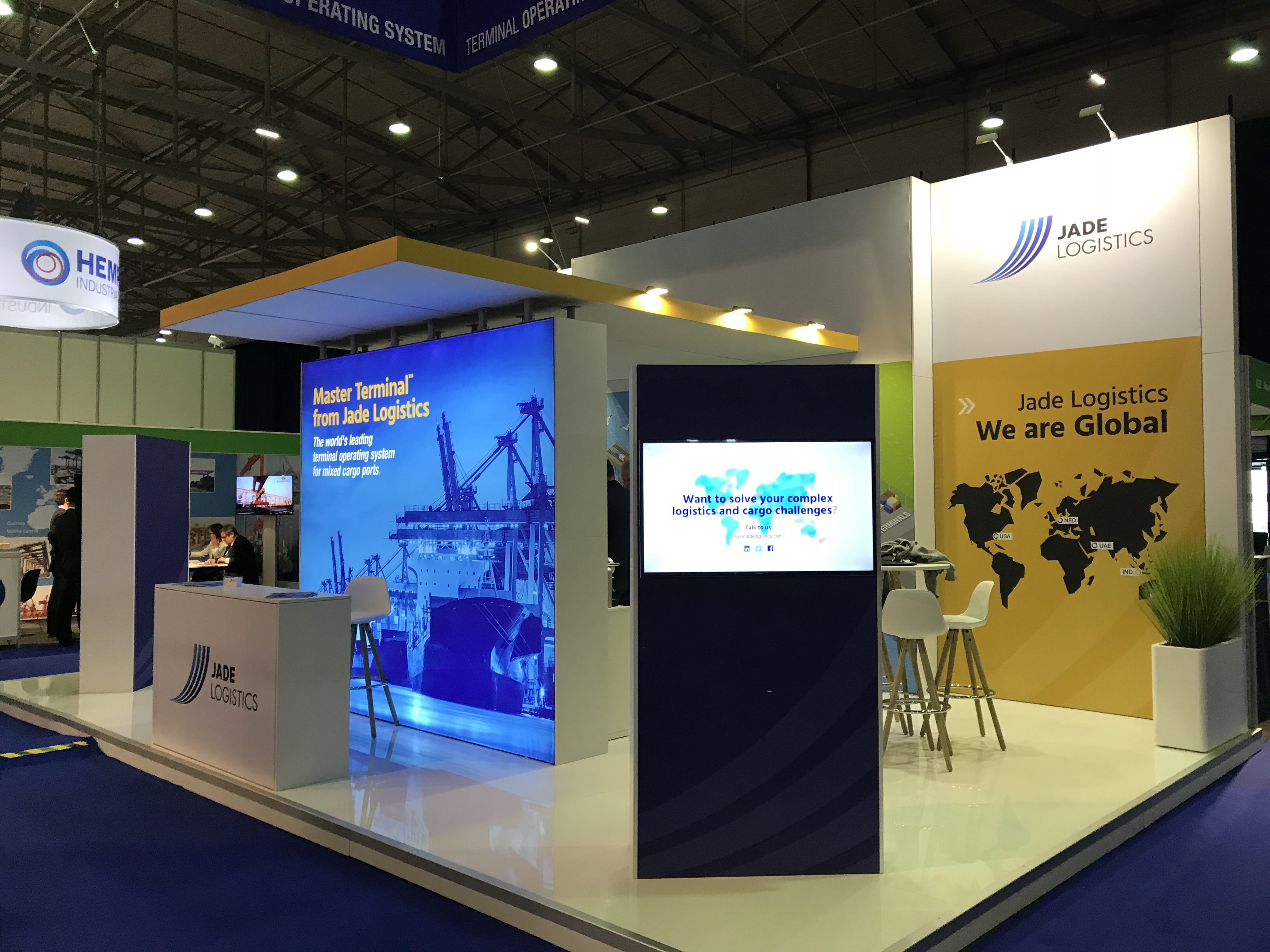
Jade Logistics recently attended TOC Europe 2018 in Rotterdam, The Netherlands, where we showcased our terminal operating system, Master Terminal.
TOC Europe is the biggest event of the year for us and was especially exciting this year as we proudly displayed our rebranded visual identity on our booth. It was a busy three days and we enjoyed meeting so many of you there. Here is a short recap of our booth for those who want to know more:
This year we made a bold (40sqm!) statement with our presence, which allowed us to highlight the various aspects of Master Terminal – the leading terminal operating system (TOS) for mixed cargo ports.
Tony Davis, Director of Marketing, reported there was a high level of interest in Master Terminal, particularly in the mixed cargo space which is seeing continued growth, with a record number of demonstrations given by the team.
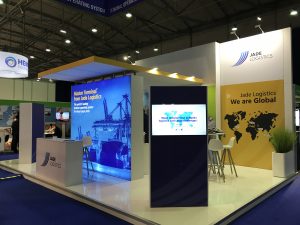
Speaking at one of the TOC Europe Sessions was Vincent Macheda, General Manager – Systems & Strategy, Australian Amalgamated Terminals (AAT). Vincent spoke about how the use of innovative, agile and integrated technology, such as Master Terminal, has helped them increase efficiency and streamline processes at their mixed cargo terminal. This presentation was well received by attendees.
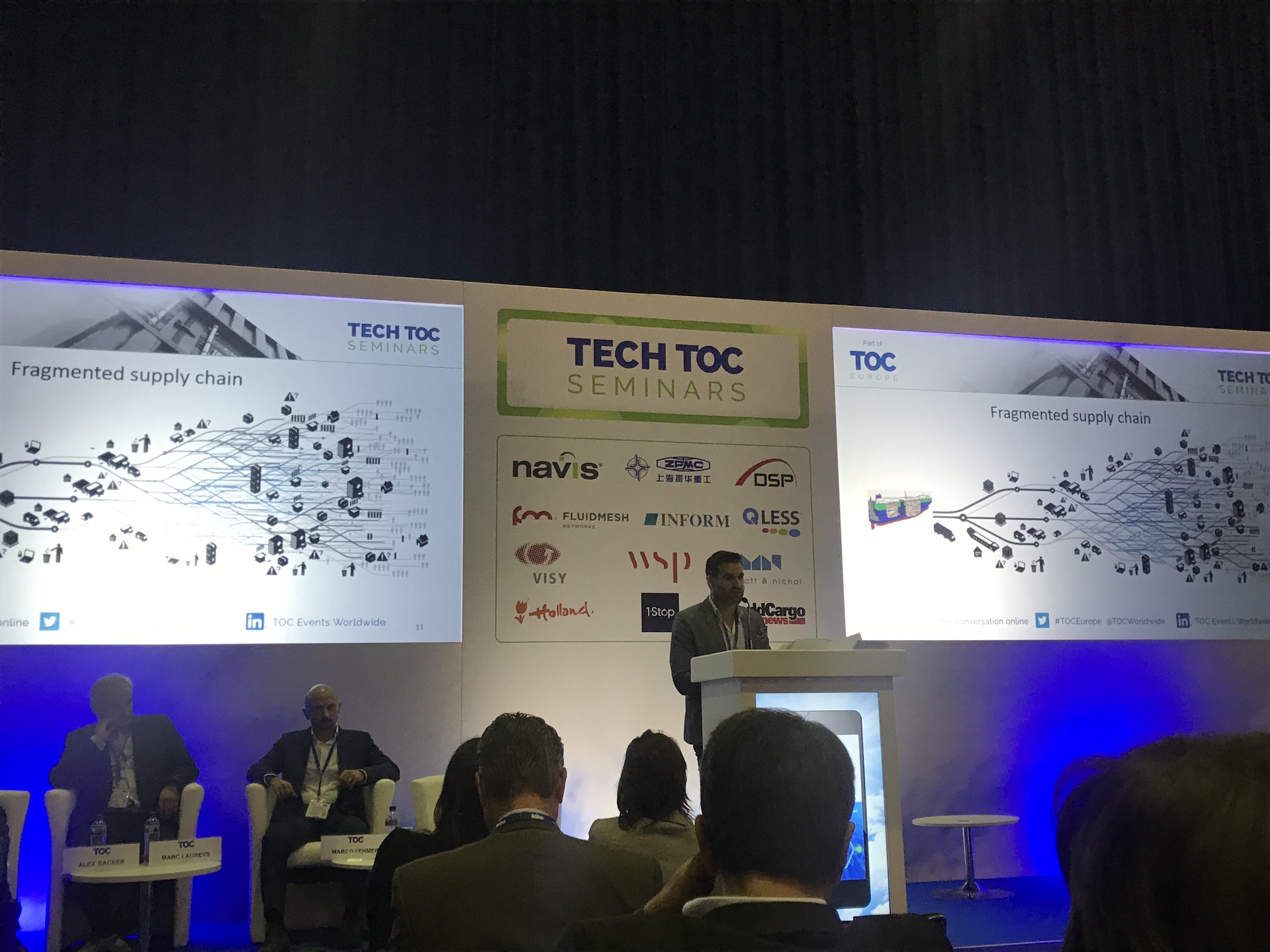
A recurring topic of conversation at TOC Europe was the importance of a dedicated TOS for the mixed cargo market, given the challenges that mixed cargo presents to port operators.
Many visitors to our booth were drawn in by our Port of Jade Logistics illustration which allowed our team to show how Master Terminal works across a port’s entire operations. Designed for mixed cargo, Master Terminal provides a single integrated, real-time view of all operations and data, resulting in improved productivity and operational efficiency.
Live demos on the booth further proved this critical functionality.
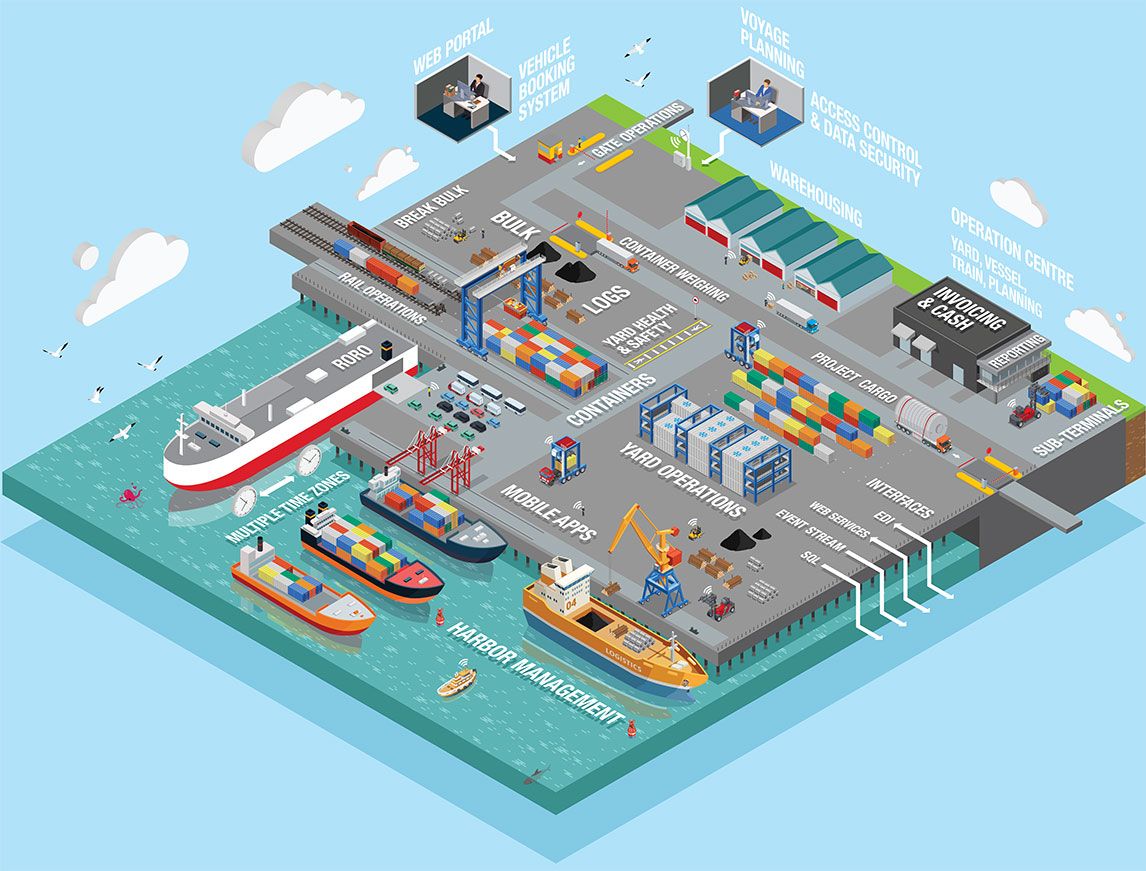
Thank you – and see you next year!
Finally, thank you to everyone who stopped by and said hello during TOC Europe! If you missed us here, you can see us at Breakbulk Americas in Houston, 2-4 October, 2018.
Thanks for visiting the Master Terminal team!
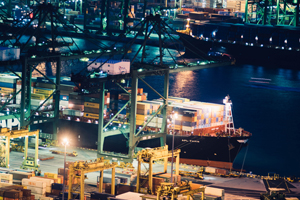
Jade Logistics CEO, David Lindsay, recently spoke to WorldCargo News about the new path for Jade Logistics, which is experiencing fast growth on a global level.
The article is reproduced below.
Now that Jade Logistics has been spun off from Jade Software Corporation (JSC), the company is looking to grow aggressively as it targets the multi-cargo terminal sector.

As reported previously, JSC underwent a corporate restructuring last year, with the UK’s Skipton Building Society buying out founder Sir Gill Simpson and USA Health Investors LLC. Jade’s port and transport business was spun out of JSC as Jade Logistics, which is now owned by USA Health Investors.
Speaking with WorldCargo News, David Lindsay, CEO of Jade Logistics, said the changes were driven by a need for “shareholder realignment” behind the strategies of the different divisions. One side of Jade Logistics’ business was focused on digital applications in commerce and finance, while the other was focused firmly on the port and logistics business. Skipton was looking for a slower, more conservative growth path in commercial applications, while the port and logistics business was experiencing faster growth on a global level. Dividing the company put the digital business of Jade with banking sector shareholders, while Jade Logistics is now owned by a software investor.
Lindsay stressed that the change is positive for Jade Logistics. It wants Master Terminal to be the number one TOS solution for multi-cargo terminals, and is targeting revenue growth of 30-50%. USA Health Investors is, said Lindsay, supporting Jade Logistics with both “financial and intellectual” commitment.
Jade Logistics’ owners are backing its strategy, which will require capital for both development work and expansion of the overseas sales and support network. There are no plans to take the Jade Logistics headquarters out of Christchurch, New Zealand, but there will be significant offshore expansion, Lindsay explained.
Jade Logistics will continue to base Master Terminal on the core JADE language and back-end environment, which it now licenses from Jade Software (along with 50-60 other software firms). At the same time, Jade Logistics will continue to focus on making the functionality in Master Terminal accessible to users outside of administrators, using mobile apps. This, Lindsay added, will mean development work will increasingly be in ‘conventional’ languages like C#, JavaScript and HTML. Jade Logistics has previously launched a series of mobile apps that have been well received. For the future it plans to focus on visibility and helping customers share more rich information beyond the terminal.
In the industry today, continued Lindsay, “there are real impediments, in terms of the amount of data or what you can share”, and Jade Logistics believes that there is a lot of value in building out the ability to share more data beyond the terminal.
While the technology will evolve, Jade Logistics’ core market will remain the multi-cargo sector. Lindsay acknowledged that this space is getting more competitive, but he believes Master Terminal has a significant advantage, as it was developed from the outset for multi-cargo terminals, with a data model that can write down to the level of individual products inside a container. That multi-cargo functionality is still helping win business today, including a new contract from one of Indonesia’s state-owned port operating companies to roll out Master Terminal at 14 terminals across one region. Master Terminal has multi-terminal functionality, and each terminal will be set up as a separate business of Master Terminal running within one instance of the TOS, allowing a single view of operations.
The number of terminals running Master Terminal has increased significantly in the last three years, and now numbers 126, including Hamad Port in Qatar which is operating at over 1M TEU a year, with a further 20 implementations underway. Lindsay says that this pace is sustainable, and Jade Logistics’ record for deployment is rolling out Master Terminal at 17 terminals for one customer in Australia in 10 months, while implementing other projects at the same time. “We are proud of that, and we don’t think anyone else can do it,” concluded Lindsay.
View the original article here.
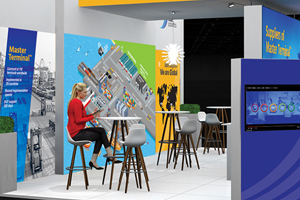
TOC Europe is the leading event for container and cargo supply chain professionals across Europe. The conference showcases excellence in port and terminal operations around the world.
Jade Logistics are exhibiting at TOC Europe from 12-14 June. The conference is taking place at the Ahoy Conference Centre in Rotterdam. We will be at Stand C100, come meet with our team and let them show you how you can streamline your operations with our TOS, Master Terminal.
Master Terminal has been specifically designed to manage mixed cargo and is helping ports and terminal operators all around the world manage their cargo requirements.
Make sure you also make time to visit the Tech TOC presentations, bringing together terminal operators and users to discuss current industry challenges.
Vincent Macheda, General Manager – Systems & Strategy from Australian Amalgamated Terminals (AAT) will be on the speaking panel, he will be discussing how his company used Master Terminal to meet their particular port challenges.
Join Vincent’s session Tuesday 12th June – 14:45-16:00 – “Operating Smarter – Case Studies”
We are also booking appointment times to meet with our team, if you would like to schedule your slot, get in touch with us here.
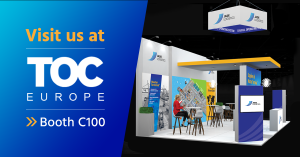

Jade Logistics’ terminal operating system (TOS), Master Terminal, has successfully gone live at Pakistan International Bulk Terminal Ltd (PIBTL).
Demonstrating its true “mixed cargo” credentials, PIBTL has implemented Master Terminal for managing its coal, cement and clinker terminal at Port Qasim. PIBTL has invested some US$285M developing the facility, which is touted as the first and only common user dry bulk facility in Pakistan, capable of handling 12 Mtpa of coal, with an average discharge rate of over 30,000 tons per day.
“PIBTL’s vision is to transform the port infrastructure through investment in the latest technologies, such as Master Terminal, and the best global standards for handling cargo. Its goal is to strive for excellence, and to build world-class port infrastructure in the country”, stated Sharique Azim Siddiqui, CEO of PIBTL.
Jade Logistics has long promoted Master Terminal as a true mixed cargo capable TOS, and PIBTL said it this was a factor in picking the software for its new facility.
“We identified Master Terminal as the leading TOS in the mixed cargo market. We will use it to optimize workflows across our operation,” said Sharique Azim Siddiqui. “Master Terminal’s comprehensive EDI capabilities, ability to interface to other systems, and sound implementation reputation gave us the confidence that it would more than meet the needs of our busy port.”
PIBTL has also implemented Jade Logistics’ Harbor Management software for berth scheduling and management of its harbor operations.
Salman Zulfikar, Senior Consulting Manager for Jade Logistics commented, “Entry into the South Asia market further enhances Master Terminal’s reputation as the world’s number one TOS for mixed cargo ports. The project was well supported by the PIBTL management, as well as the operations, finance and IT users. A combination of state-of-the-art bulk-only technologies, and the integration of Master Terminal with core weighing processes, were key to a successful implementation.”

World Cargo News recently talked to us about the launch of our suite of new mobile apps. The article is reproduced below.
Jade Logistics has launched a suite of 30 new web-based hand-held mobile apps for its Master Terminal TOS. The apps deploy mobile functionality and data capture ability to any internet-connected mobile device running the Microsoft, Android or Apple operating systems.
With the new apps, Jade is ready to support ports’ deployment of TOS functionality at different levels to different roles on the terminal, without requiring proprietary ruggedised devices that it views as expensive and lacking flexibility.
The apps include a vehicle app for mobile equipment operators. Depending on the task, and the driver’s preference, various views are available including a graphical view and a list view. Among other features, users can toggle night mode, select twinmode and customise the app to display the most important information in the most prominent areas on screen.
Like all the Jade apps, the Vehicle app is updated at the server level, so there are no software updates needed at the device level to maintain the app.
Delphine Ducaruge, product manager, said the need for 30 different apps reflects the diversity of specific roles at marine terminals, and each app is for a specific purpose, such as truck checking at a gate, or reefer container monitoring. There is, she added, no risk that the number of apps could become a source of frustration to people on the ground using the Jade Master Terminal TOS. An administrator decides who has access to what apps, and most users will typically have access to only “a couple”, and will stay in a single app for several hours while they work.
Grupo CICE in Veracruz was part of the beta programme to test the new Master Terminal web-based mobile apps. “The suite of 30 web apps spans CICE’s entire port operation, from splitting and merging cargo, through to loading or unloading a truck, and replaces their long-serving Windows applications,” stated Jade. “CICE, who are forwardthinking technology enthusiasts, rigorously tested the new apps over a two-month period, working closely with Jade Logistics to ensure the functionality developed would deliver real benefits to their port.”
Genaro Mendez, director of information technology at CICE commented that the new web-based apps were a welcome addition to the company. “Today’s terminals must be more responsive,” he said. “They must adapt to new technology quickly to remain competitive. We recognised the benefits the web apps would deliver, and made the decision to upgrade as soon as they were released.”
The ability to use commodity hardware also resonated with CICE. “We no longer need to invest in expensive ruggedised equipment. Today’s readily available and inexpensive tablets and smartphones, with a supported web browser, are all that is required to use the apps,” said Mendez.
Using smartphones, tablets or laptops instead of so-called ruggedised devices challenges the conventional wisdom about the working environment in ports. As WorldCargo News has discussed previously, ports often purchase expensive ruggedised devices with high IP and Mil-Spec ratings that have proved to be more durable in industrial applications.
However, the gap between ruggedised and commodity devices has closed significantly in recent years (the iPhone 8 is rated to IP67, for example), and cases/covers can be used for extra protection.
Jade believes its apps can replace mobile computers connected to a TOS, across virtually the whole terminal. The STS cranes are the exception, and Ducaruge noted that, for safety reasons, “ports don’t want to add extra technology to the STS cranes”…
Published World Cargo News: November 2017.